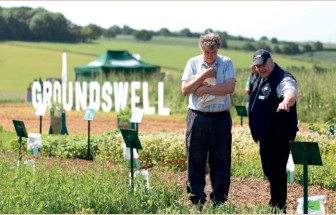
It’s an interesting time to be farming and, as readers of Direct Driller will appreciate, we all have important decisions to make about how we want to take our farms forward. The war currently raging in one of the world’s key breadbaskets is focussing a lot of minds on how agricultural policies should be reframed to ensure a constant and relatively cheap supply of food worldwide. We probably all have our own theories as to how this could be achieved.
We’ve got a lot of talks about nearly everything to do with this at Groundswell this year, from politics with Henry Dimbleby talking about his Food Strategy one year on and politicians of various hues giving their views, to ways of farming that use resources we can grow, like woodchip, compost, soil (we can grow that too), nitrogen and so on, through to techniques and ways of farming that benefit us the farmers as well as the environment and consumers.

I won’t bang on about it as by the time this comes out it’ll probably be too late to secure a ticket, but I’m thrilled that we’ve got Dwayne Beck, Jill Clapperton and Greg Judy amongst dozens of other speakers…all helping us to see our farms in different ways, or maybe find different ways to farm. There’re also a bunch of speakers telling us interesting stuff, like Lennart Olsson who’s flying in from Lund University in Sweden to tell us how the research that they are conducting over there (in association with the Land Institute in Kansas) into developing perennial wheat and other crops. I’m hoping some UK institution can pick up on this.
Meanwhile, back on the farm it’s been boringly dry here, we missed all the juicy storms that rattled round the country in May and April was unshowery, so spring crops look patchy at best and non-existent at worst. It wasn’t just the dry, a good chunk of management error played its part: not destroying our cover crops early enough. The ground lay cold and wet over winter and I foolishly thought having a good cover would help dry it out. It did dry it out, but rather slower than bare ground and it dried it at root depth too, which is proving unhelpful to the crops we’ve sown. We’ve made variations of the same mistake three years running and we’ve had three cold dry springs in a row. Back of the class for us. It’s not as though no-one warned us.
This time last year I was feeling really smug about how well our winter wheats were looking having just had a programme of nutrition and no fungicides. Then the weather turned a bit rusty, as did the wheat and then a wheel fell off the sprayer so we got a bit behind and what with putting on a show and stuff we took our eye off the ball long enough to do damage to yields. Back to 1970’s levels, but at least it’s worth a lot.
Winter wheats look good this year too at the moment. They’ve had fungicide I’m sorry to say and they still look a bit thin in the rows, but nice and clean on the whole. Winter oats are a bit messy and knee height. We haven’t put much nitrogen on anything, it has been too dry to spray the stuff about (at these prices) and watch it evaporate.
By now you’ll be wondering why Chris has asked me to do a Farmer Focus, the sort of idiot that gives direct drilling a bad name. I’m hoping it cheers people up to know that there’s someone making bigger mistakes than they are, it consoles me to think I may be spreading joy.

The cattle are doing brilliantly though, it looks like they’ll be making more money per acre than the crops. Having herbal leys about the place is joyous enough even before we raise the grubby matter of profit emanating from them. I love the cattle, I love that they are making money, I love what they do to the soil and I love how they make me see ‘farming’ in a different way.